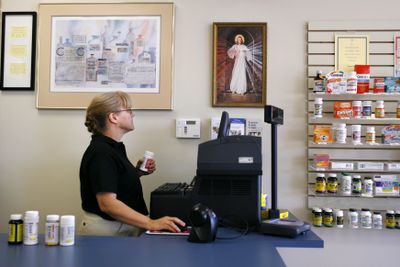Birth control refusals based on following faith
More pharmacies refusing pills for religious reasons

CHANTILLY, Va. – A new drug store at a Virginia strip mall is putting its faith in an unconventional business plan: No candy. No sodas. And no birth control.
Divine Mercy Care Pharmacy is among at least seven pharmacies across the nation that are refusing as a matter of faith to sell contraceptives of any kind, even if a person has a prescription. States across the country have been wrestling with the issue of pharmacists who refuse on religious grounds to dispense birth control or morning-after pills, and some have enacted laws requiring drug stores to fill the prescriptions.
In Virginia, though, pharmacists can turn away any prescription for any reason.
“I am grateful to be able to practice,” pharmacy manager Robert Semler said, “where my conscience will never be violated and my faith does not have to be checked at the door each morning.”
Semler ran a similar pharmacy before opening the new store, which is not far from Dulles International Airport. The store only sells items that are health-related, including vitamins, skin care products and over-the-counter medications.
On Tuesday, the pharmacy celebrated a blessing from Arlington Bishop Paul S. Loverde. While Divine Mercy Care is not affiliated with the Roman Catholic Church, it is guided by church teachings on sexuality, which forbid any form of artificial contraception, including morning-after pills, condoms and birth control pills, a common prescription used by millions of women in the United States.
The drugstore is the seventh in the country to be certified as not prescribing birth control by Pharmacists for Life International. The anti-abortion group estimates that perhaps hundreds of other pharmacies have similar policies, though they have not been certified.
Earlier this year in Wisconsin, a state appeals court upheld sanctions against a pharmacist who refused to dispense birth control pills to a woman and wouldn’t transfer her prescription elsewhere. Elsewhere, at least seven states require pharmacies or pharmacists to fill contraceptive prescriptions, according to the National Women’s Law Center. Four states explicitly give pharmacists the right to turn away any prescriptions, the group said.
The Virginia store’s policy has drawn scorn from some abortion rights groups, who have already called for a boycott and collected more than 1,000 signatures protesting the pharmacy.